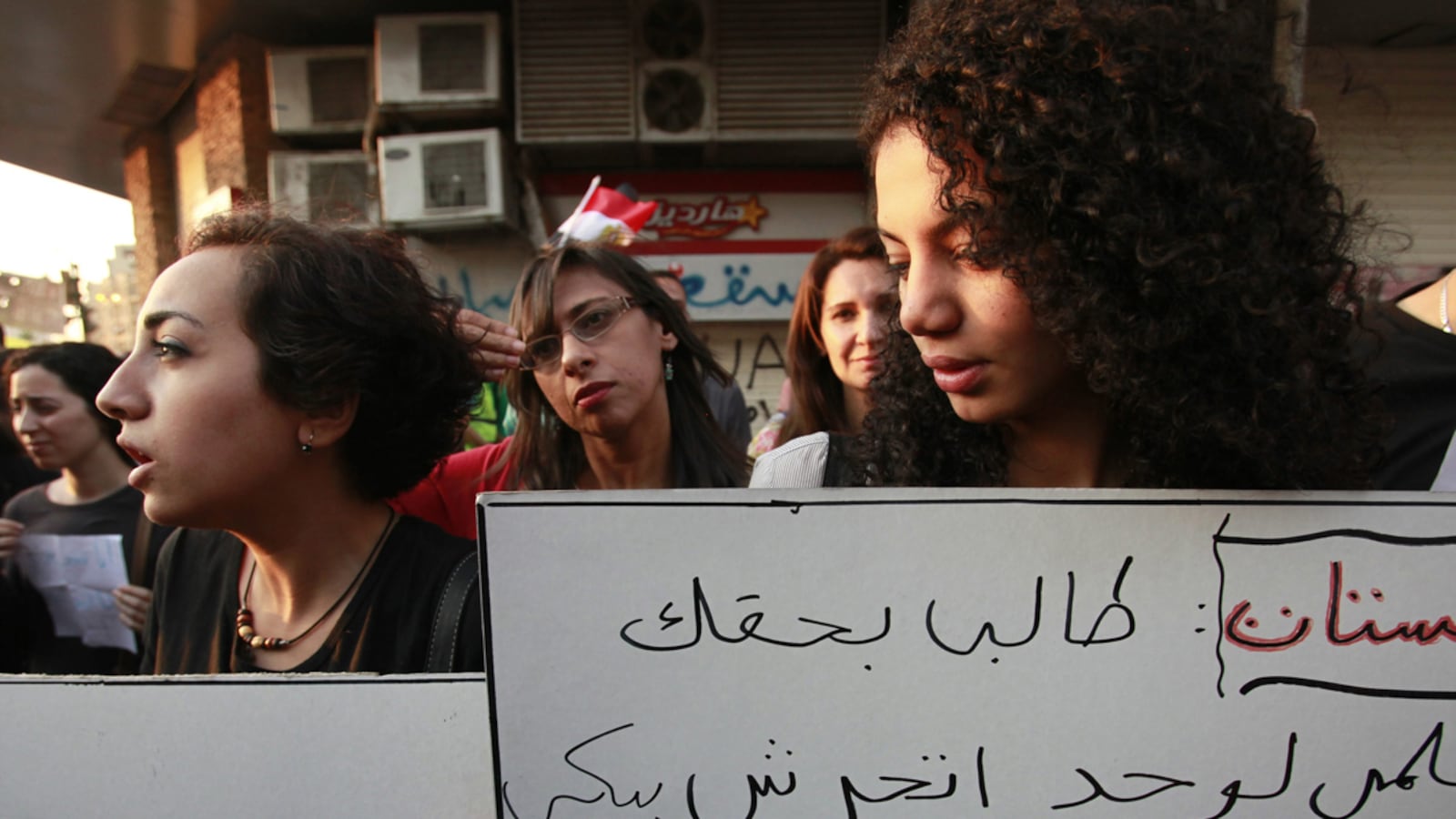On the night former Egyptian President Hosni Mubarak was sentenced to life in prison, 26-year-old IT officer Nihal Saad and four of her friends joined the tens of thousands who returned to Tahrir Square to protest the verdict, which many believed would be reversed on appeal. At 8:30 p.m., they were attacked by a group of men whose numbers seemed to double by the minute.
The perpetrators crammed in so tight, Saad couldn’t lift her arms, she said; the sexual assault began. It felt like they were touching everywhere. One of Saad's friends was the biggest target: they pulled off her shirt, then her pants, raping her with their hands. When the group finally got away, an hour and a half later, they went straight to the hospital.
It was not an isolated incident.
On and off for the last week—as voters head to the polls in the second round of presidential elections scheduled for June 16 and 17 after a week of renewed demonstrations at Tahrir—large groups of men have sexually attacked women at the birthplace of Egypt's 18-day revolution last year that brought down the Mubarak regime.
In response to the assaults, Saad and her friends had planned a march to call for gender equality and demand the right to assemble without fear. On Friday night, around 50 women heeded their call, chanting for a little over an hour—until men swarmed their protective human cordon and again attacked. Men seemed to appear from nowhere, grabbing, groping, ripping clothes, stealing phones and money.
Sexual harassment is endemic in Egypt, but assault by groups of dozens or hundreds of men is not. “It didn’t seem normal. Everything about it was wrong. It didn’t seem like the day-to-day harassment that women get, it seemed organized,” Saad says of what’s been happening over the last week in Tahrir.

Her friend Leil-Zahra Mortada, a filmmaker who participated in the march, put it another way: “Big groups, this is what made us suspicious. Would all of the sexual harassers in Cairo just gather in front of Hardee’s?” he asked about the restaurant where most of the large attacks transpired.
Some activists have called the spat of group assaults a coordinated effort to keep women out of the political sphere, while others see it as Egypt’s deep-rooted patriarchy at work. But there’s broad agreement that the attacks are likely to damage the revolutionary movement, and discourage women from broader participation in politics.
“I’m sure this will affect the revolution negatively. We have seen during the 18 days before Mubarak was brought down, women were there, there was not a single harassment report, nothing happened. It was very inclusive—men, women, Muslims, Christians, everyone. It was like heaven,” says Dalia Ziada, executive director of the Ibn Khaldun Center for Development Studies, who thinks the harassment was spontaneous.
“As soon as the revolution stops being inclusive, it leads to dire consequences,” she said. “It will make women revolutionaries stay at home and not participate. Thus, it will weaken the protests and the cause behind the protests.”
Egypt is a patriarchal country, and women are underrepresented in government, protests, and the workforce. Sexual harassment is rampant. A 2008 study by the Egyptian Center for Women’s Rights found that 83 percent of Egyptian women have experienced some amount of sexual harassment on the street, as have 98 percent of foreign visitors. Sixty-two percent of men admit to having sexually harassed women. Although there were few reported incidents of sexual harassment in the vast crowds that thronged Tahrir Square last year, the attacks resumed almost immediately after the government fell. On the night Mubarak stepped down, Lara Logan, a journalist for CBS, was sexually assaulted by a mob.
Under the rule of the Supreme Council of the Armed Forces (SCAF), which took power after Mubarak stepped down, military-led harassment of women became a part of the intimidation of the protesters, who had continued gathering throughout the year, calling for further reform. It is a tactic activists allege SCAF resurrected from Mubarak’s reign.
Last March, the army violently cleared a demonstration in Tahrir and detained at least 18 women. According to Amnesty International, male soldiers beat and strip-searched them. Seven said they were forcibly given “virginity tests.” One of the women, who filed a suit against the government, told the media that a male doctor had put his hand in her “chastity” for five minutes. The accused doctor was acquitted in March. In December, military police dispersing protesters dragged a woman across the asphalt, beating her and ripping her clothes to reveal her blue bra.
“For me, this is part of the counterrevolution: SCAF, the military, remnants of the old regime, interested parties, people who have a vested interest in returning to the old system,” says Nadine Wahab, a Tahrir regular and member of Our Right, a movement that grew out of Dr. Mohamed ElBaradei’s canceled presidential campaign.
Wahab believes targeting women—whose presence in Tahrir decreases the likelihood of clashes—is a deliberate attempt to allow for more street violence that in turn undermines the revolutionary movement. “When our mothers, our sisters, and family are present, the environment shifts. And you can’t hope to create a new social contract when half the society is absent,” she said.
Although women participated in large numbers in the uprising, female politicians have not moved to the forefront of Egypt’s governing institutions. Out of 498 elected parliamentarians, only nine are women. Since Mubarak’s ouster, laws affecting women's rights come up for debate in the Islamist-dominated and almost entirely male parliament, including divorce laws that govern custody, and discussions to overturn the current ban on female genital mutilation.
Not being able to safely demonstrate for their rights further discourages women from becoming a more organized political force. “If the smallest scale of the political process is not safe, going higher into the political process will not be safe as well,” says Yara Sallam, program manager at the Nazra for Feminist Studies group in Cairo. “For you to reach even a point of being a parliamentarian you have to be present in the public sphere, to campaign and compete.”
Ziada accuses both liberals and Islamist political parties of abusing women: “When they want to appear more open minded, or increase their numbers, they just add women, to say ‘look, we have women on our tickets.’ In fact they are not doing this for the sake of women, not for helping women, but helping themselves by abusing women,” she says. “It’s a patriarchal society, they don’t respect women and only see [them] as sexual object[s]. They don’t see women any other way than their sexual toy, and we have to change this.” She thinks only a law banning sexual harassment that is actually enforced can begin to change things. To that end, groups are starting nationwide awareness campaigns to combat sexual harassment. Mortanda and Saad have vowed to stay in the streets to fight for women’s rights. But it seems some of the damage has already been done.
Wahab is one of the activists who had stood on the frontlines, braving tear gas and rock-throwing battles with security forces, but now checks with her friends about women-specific safety before going to Tahrir.
For her part, Saad isn’t sure how she feels about the birthplace of the revolution anymore. “I wouldn’t organize anything else on Tahrir until we figure out who these people are,” Saad explained. “And it’s breaking my heart because Tahrir is somewhere I felt safest.”






